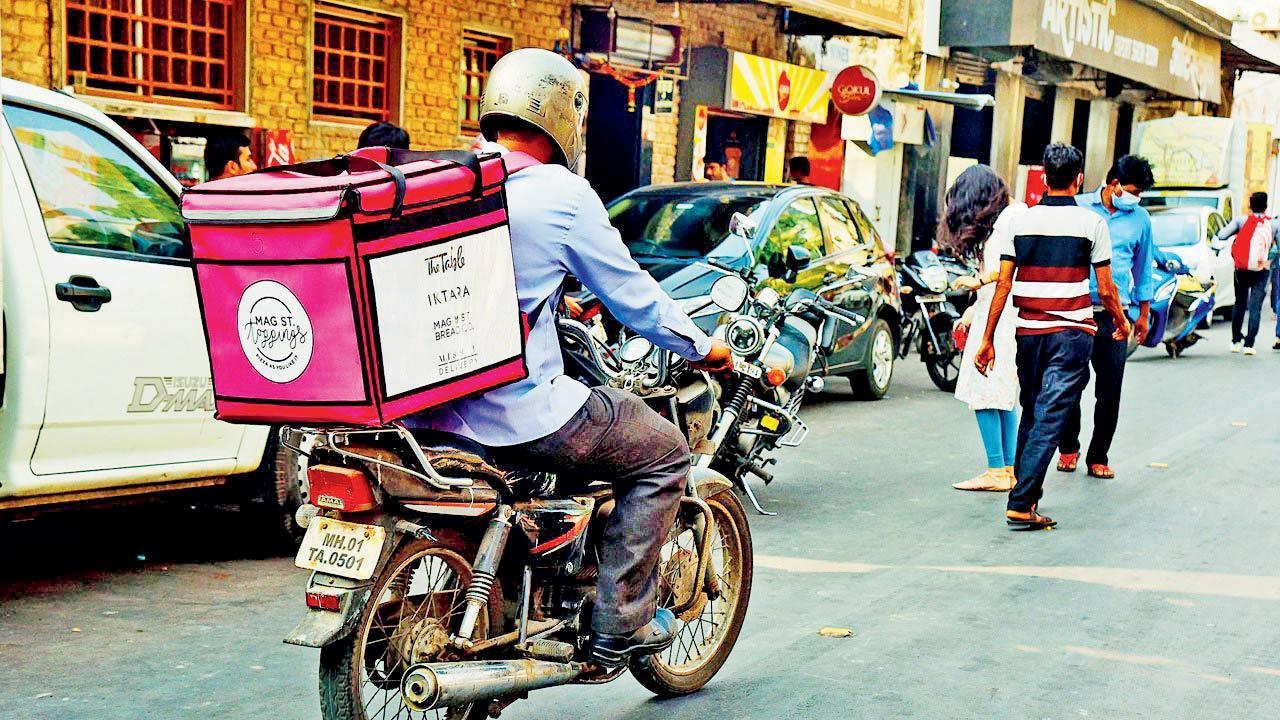After last year’s symbolic log-out movement, NRAI to hold three educational sessions to help eateries depend less on aggregators

Magazine Street Kitchen’s employee on the way to deliver food. File Pic/Shadab Khan
Restaurants and food aggregators across the city have had a rocky relationship since the year 2019, when the NRAI spearheaded a logout movement against deep discounts offered by these online delivery platforms. Two years later, the National Restaurant Association of India (NRAI) will be educating restaurateurs on how to become less dependent on the aggregators and rebuild direct connection with their customers.
ADVERTISEMENT
Magazine Street Kitchen’s delivery executive at Gateway of India. File Pic/Shadab Khan
The aggregators’ basic structure allows it to keep a lion’s share of the restaurant delivery revenue for its services, including delivery, discovery and tech support. After the Covid-19 hit the country, the business model changed majorly with restaurants shifting from dine-ins to delivery to keep their business afloat and pay staff.
At the NRAI’s monthly online forum Town Hall yesterday, the session, titled ‘Delivering Profits #OrderDirect’, delved into ways to mitigate the challenges in improving direct orders from customers. The NRAI will hold the online bootcamp from May 11 to 13 covering various aspects, including Digital Marketing.
‘Dependency very high now’
Anurag Katriar, NRAI president and executive business director of deGustibus Hospitality, said, “Today, we have a very high dependency on aggregators for our home delivery business. While we are not saying we should do away with aggregator apps as they bring us substantial revenue, it is time to create an alternate source that doesn’t work on co-dependency.” With dine-in closed, home delivery and takeaways have become the main source of income for restaurants. In a bid to prevent giving up over 40 per cent cuts to aggregators on every order, Riyaaz Amlani — CEO & MD of Impresario Handmade Restaurants — called his session ‘Back to the Future’.
“Five years ago, there were no aggregators and we were directly communicating with our guests. That is why our industry is called the hospitality industry. Our guests came to us directly to dine-in and for home delivery, and we served them with a smile. There is no better time than this to go back to building our own customer base and serving them directly once again. In the past few years, we’ve gotten complacent and lazy when it comes to delivering an order to the customer at home, allowing aggregators to keep our database from us. Today, we don’t know who we are serving. Data masking is an evil that needs fixing,” said Amlani. “It is not okay for a restaurant to not know who their customer is.”
Quality control
One example of a restaurateur having successfully managed to create an order-direct platform, along with still being on aggregator platforms, is Gauri Devidayal, Partner, Food Matters. “There are three important aspects that motivated us to set up our direct ordering platform: quality, control and profit. Quality in terms of experience our guests have in the way the food is delivered. Knowing what our customer preferences are, and being able to deliver that day after day isn’t possible if you don’t know who you are serving,” said Devidayal, admitting that this was not going to be an easy process, after all aggregators have had years of a head start on this.
Rahul Singh, NRAI trustee and Beer Café founder & CEO, moderated a panel on the road ahead with Aseem Grover of Delhi’s popular The Big Chill Café, chef Manu Chandra, Pratik Pota of Jubilant Food Works and Saransh Goila of Goila Butter and Yash Bhanage of The Bombay Canteen and O Pedro. “The aggregators need to be more business-friendly; one can’t deny the role they have played in creating a robust distribution channel and driving up volumes for the restaurants. We, therefore, will continue to co-exist in the typical love-hate relationship. Tech, after all has to be an enabler, and not a distorter,” Singh summed up.
 Subscribe today by clicking the link and stay updated with the latest news!" Click here!
Subscribe today by clicking the link and stay updated with the latest news!" Click here!






